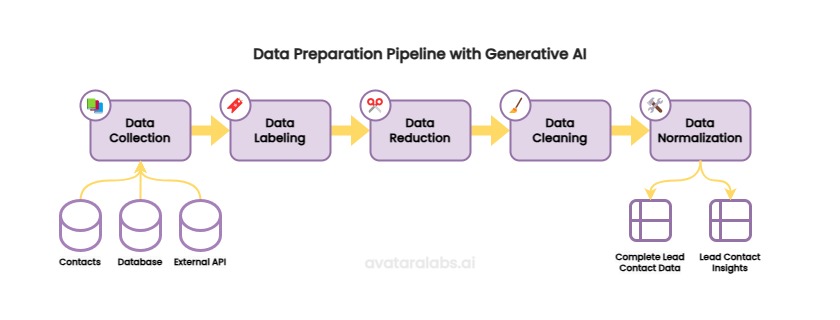This is the first part of Boosting B2B Sales with AI series. Subscribe to our newsletter for new article notifications!
In the competitive realm of B2B sales, efficiency and strategy are paramount. The process can be a complex journey, fraught with challenges that can frustrate even the most seasoned sales teams. Understanding these pain points is crucial to developing strategies to overcome them and drive success.
Quality of Leads Data
Effective sales processes rely on a robust foundation of leads data. It’s not just about having a list of names and email addresses; it’s about understanding the context behind each lead. Lead data extends far beyond basic contact information. It encompasses a wealth of insights that can significantly impact your B2B sales strategy.
Ineffective Follow-Ups
Timely and relevant follow-ups are crucial in maintaining interest and moving a lead through the B2B sales funnel. However, when executed poorly, they can lead to missed opportunities and dwindling interest. Effective follow-ups today depends solely of human touch, punctuality, and contextual awareness.
Strategy of Producing Good Sales Material
Compelling sales material supports the sales narrative and helps overcome buyer objections. Sales material isn’t just a collection of words and images; it’s a strategic blend of information, persuasion, and creativity. Without it, the sales team may struggle to communicate value.
Integration with Marketing Tools
In today’s dynamic business landscape, integration with marketing tools is not just a convenience—it’s a strategic necessity. It should pursue a better data flow and efficiency, unified customer experience while keeping it as easy as possible to be implemented.
This is where Artificial Intelligence (AI) steps in, offering a revolutionary approach to automate mundane tasks and empower B2B sales reps to focus on high-impact activities. For our first article in this enlightening series, we’re diving into the very first task.
Increase Sales-Ready Leads, Leading More Conversions
According to a 2020 report by McKinsey & Company, “B2B sales leaders are increasingly turning to AI to identify high-value prospects and personalize outreach efforts.” The report further highlights that companies leveraging AI for lead scoring can expect to see a 15-20% increase in lead conversion rates.
Similarly, a 2023 eConomy report by Organisation for Economic Co-operation and Development (OECD) emphasizes the growing adoption of AI in B2B marketing, stating that “AI-powered lead scoring and qualification are becoming essential tools for optimizing marketing spend and driving sales growth.”
Improving the Quality of Leads Data
Here’s why a good B2B sales leads data quality matters:
Company Insights
Understanding the industry and size of the company it operates in is essential. Different sectors have unique challenges, regulations, and trends.
Role and Responsibilities Insights
Knowing a lead’s job title provides critical context. Is this person a decision-maker, an influencer, or a gatekeeper? Understanding their role helps tailor your communication appropriately.
Engagement History
Analyze past interactions. Did the lead attend webinars, download resources, or visit specific pages on your website? These behavioral cues guide your follow-up strategy.
Incomplete or inaccurate leads data can result in wasted time and resources. Investing in high-quality data ensures that your B2B sales efforts are targeted, relevant, and ultimately more successful. Remember, leads are more than just names—they’re potential relationships waiting to be nurtured.
Automate Data Collection with Generative AI
Generative AI enables the automation of data analysis, ensuring that only high-quality, relevant leads are pursued. Usually there are 3 steps to accomplish a good data collection for your B2B sales leads.
Data Collection
The process begins with data collection, where Generative AI algorithms gather information from various sources, including social media, company websites, and public records. The AI then analyzes this data to identify patterns and trends that indicate a high likelihood of lead conversion.
Natural Language Processing
Next, the AI applies natural language processing to clean and organize the data. This step involves removing irrelevant information and categorizing leads based on specific criteria such as industry, company size, and decision-maker roles.
Predictive Analytics
Once the data is structured, Generative AI employs predictive analytics to score leads. It uses historical conversion data to predict which leads are most likely to result in a sale. This scoring system helps B2B sales teams prioritize their efforts and focus on leads with the highest potential for success.

Future Outlook on AI Adaptation
In conclusion, AI is rapidly transforming the B2B sales landscape by improving lead data quality. With leading institutions like McKinsey reporting significant increases in conversion rates due to AI-powered lead scoring, the future of sales seems intertwined with intelligent automation. Another marketing automation platform, Marketo uses AI to analyze lead behavior and engagement. By identifying leads who are actively researching similar solutions or engaging with specific content, Marketo helps businesses focus on qualified leads. This resulted in a reported 10-20% increase in conversion rates with a 50% increase in B2B sales-ready leads for their clients, according to Intelliarts.
As AI technology matures and integrates seamlessly into B2B sales workflows, we can expect even more efficient and effective lead generation and nurturing processes, ultimately leading to a future where sales teams focus on high-impact interactions and maximizing customer satisfaction.